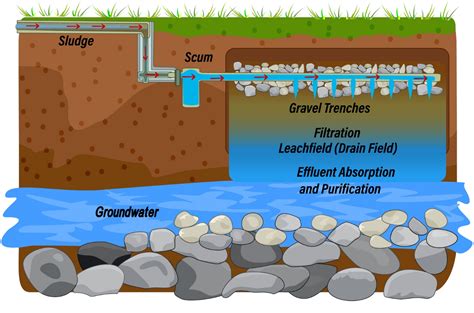Septic Tank Issues: Could Proximity Be the Cause?
Septic tank problems are a homeowner's nightmare, leading to costly repairs and potential environmental hazards. While several factors can contribute to septic system failure, proximity to other structures, utilities, and even natural features can play a surprisingly significant role. Understanding these potential proximity-related issues is crucial for preventing problems and ensuring your septic system operates efficiently for years to come.
What are the Common Septic Tank Problems?
Before we dive into the impact of proximity, let's briefly review some common septic tank issues. These include:
- Clogging and backups: This is often caused by the accumulation of solids in the tank or the leach field, leading to sewage backing up into the house.
- Slow draining: This indicates a partial blockage somewhere in the system, either in the pipes, tank, or leach field.
- Foul odors: A strong, unpleasant smell emanating from the tank or surrounding area suggests a problem with the system's seals or a blockage.
- Leaking: Leaks in the tank or pipes can contaminate groundwater and soil, leading to serious environmental problems and potential health risks.
- Leach field failure: The leach field, responsible for filtering wastewater, can become saturated or clogged, leading to system failure.
Could Proximity to My House Cause Septic Issues?
The proximity of your septic tank to your house is a critical factor in potential problems. If the tank is too close, the weight of the house could cause settling and cracking of the tank, leading to leaks. Furthermore, the roots of nearby trees and shrubs can penetrate the tank and leach field, causing blockages and structural damage. Ideally, your septic tank should be a certain distance from your home's foundation, as specified by local building codes.
How About Proximity to Other Structures or Utilities?
The placement of your septic system relative to other structures and utilities is also vital. Factors to consider include:
- Driveways and sidewalks: Heavy vehicles driving over the leach field can compact the soil, reducing its ability to filter wastewater. Construction near the system can also cause damage.
- Other buildings: Similar to the house, other buildings can cause settling and damage to the tank and pipes.
- Wells and other water sources: The septic system should be far enough from wells and other water sources to prevent contamination. Local regulations usually dictate a minimum distance.
- Underground utilities: Proximity to underground utilities such as gas lines or electrical cables increases the risk of damage during excavation or repairs.
What About Proximity to Trees and Landscaping?
Trees and shrubs pose a significant threat to septic systems. Their roots can penetrate the tank and leach field, causing blockages and structural damage. Therefore, maintaining a root-free zone around your system is essential.
How Does Proximity to the Property Line Affect My Septic Tank?
Your septic system's location relative to property lines is crucial, particularly if you're considering selling your home. Building codes usually dictate minimum distances to ensure proper functioning and prevent contamination of neighboring properties. Ignoring these regulations can lead to costly legal battles and environmental fines.
How Can I Prevent Septic Tank Problems Related to Proximity?
Preventing problems related to proximity involves careful planning and maintenance. This includes:
- Professional site assessment: Consult a professional septic system installer before installing or modifying your septic system.
- Adhering to building codes: Follow all local building codes and regulations regarding septic tank placement.
- Regular inspections and maintenance: Schedule regular inspections and pumpouts to prevent clogs and backups.
- Careful landscaping: Avoid planting trees or shrubs near the septic system. Maintain a buffer zone of grass.
- Avoid heavy traffic: Prevent heavy vehicles from driving over the leach field.
By understanding the crucial role proximity plays in septic tank issues and taking proactive steps to mitigate potential problems, you can ensure the longevity and efficient operation of your septic system, saving yourself significant time, money, and stress. Remember to always consult with local authorities and qualified professionals for specific advice tailored to your situation.

